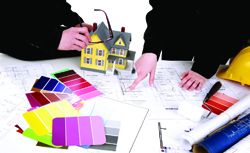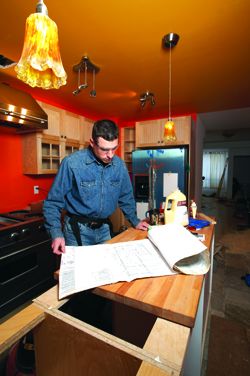
The contractor is key to a successful home project, but it's a team effort.
Who's in Charge?
 Chances are, you’ve heard one of those horror stories about a remodeler whose shoddy work had to be redone or a contractor who skipped town without finishing a job. It happens, of course—but it's not likely if you’re careful.
Chances are, you’ve heard one of those horror stories about a remodeler whose shoddy work had to be redone or a contractor who skipped town without finishing a job. It happens, of course—but it's not likely if you’re careful.
The key? Working with a contractor who’s experienced, reputable and has a reputation for quality and dependability. That requires doing some homework.
Tom Trout III is president of Tom Trout Inc., the remodeling firm company his father founded 47 years ago. He advises homeowners to assume nothing and verify everything.
“When you’re interviewing remodelers, ask to see their state-certified contractor’s license,” Trout says. “And look at it carefully. I know of cases where remodelers have shown potential customers an occupational license and passed it off as a contractor’s license. Make sure you don’t fall into that trap.”
Also, Trout says, make certain the remodeler’s Worker’s Compensation and liability policies are current and in force. And ask to see projects that have been completed recently.
“Most remodelers have had a few great projects over the years,” Trout says. “But you want to know how their performance is now. Look at projects that have been completed in the past year, and talk to the homeowners.”
Also, do you have a neighbor or co-worker who recently undertook a remodeling project and loved the results? Have you admired a remodeled home featured in a local magazine or on a home tour event? Find out who the contractor was and give him or her a call.
“Get the right contractor for the job and not a handyman,” says Lex Allen, president of Solid Built Construction. “The best way to look for a contractor is to use your inner network—ask your co-workers, friends and neighbors. The best contractors are known by word of mouth.”
Homegrown businesses and local building materials suppliers also can be good sources when you’re looking for remodeling professionals. Or check with local trade groups such as the Northeast Florida Builders Association (NEFBA), which has an active Remodelers Council.
If you want to bid your project, then it’s crucial that you have detailed specifications so the proposals you receive are apples-to-apples comparisons. That means hiring an architect or a building designer.
Some remodeling firms also offer design services. Trout’s com-pany, for example, is a design/build firm, which means it has in-house resources to provide plans and specifications.
“You can choose to use us as the contractor on a negotiated basis or take our specifications and use them to get bids,” Trout says. “It’s the only way to get bids. You’ve got to have a roadmap that everybody is following.”
By the time the project is fin-
ished, any number of people representing an array of specialties may have become involved. But the contractor is the key to a successful result.
“Get the contractor first, be-
cause he’s like the conductor of an orchestra,” notes Allen. “A good contractor will have a team of designers and other professionals that he trusts and is comfortable working with.”
Remodeler Larry Murr, president of Lawrence Murr Remodeling, agrees. “I really do think that’s probably the critical cog,” says Murr. “You really do need to have one central figure in charge, and it makes sense for it to be the contractor because he has to keep the project moving.”
Maybe your project requires advice from a lighting expert, kitchen designer or someone well-versed in home automation. Experienced pros will know how to do their jobs and how to coordinate with other members of the design team.
If you’ve never tackled a remodeling project before, interview several candidates before you sign a contract. Don’t automatically hire the contractor with the lowest bid; he may not be experienced enough to understand the real costs involved in the project.
“I believe that the remodelers who are busy are the ones who have really evaluated costs and know that what they’re charging clients is what’s needed to do the job,” says Carol Whyrick of Whyrick Builders in Jacksonville">Jacksonville. “Everyone is much more budget-conscious today. Even those going for higher-end products are looking for a deal. We shop with our customers. We want to help them get the best price from local suppliers. It gives customers a good feeling because they know we’re an advocate for them.”
So, start with licensed professionals who are knowledgeable and experienced. Then, once you know they can do the job, make certain you’re personally compatible.
“You want to know how the remodeler approaches things,” Murr says. “Find out what kind of person he is. There are personalities involved and it’s important you get comfortable with that person. And he can put together a good team for you.”
 Remodeling? Do Your Homework
Remodeling? Do Your Homework
Remodeling projects can take weeks, months or even years, and during that time, the contractor and his or her crews will be in and around your home almost constantly. So make certain you choose qualified people who know how to communicate with you—and with one another.
Be wary of a stranger who knocks on your door soliciting work for too-good-to-be-true prices—and never hire anyone if you can’t verify the person’s credentials or the information on the business card.
Members of the local Remodelers Council at the Northeast Florida Builders Association offer additional tips on choosing the right professional for your project:
> To find a reputable remodeler, get referrals from family, friends, neighbors or someone else who has had remodeling work done. Or ask people in the industry: architects, building materials suppliers and engineers. Even a lender may offer recommendations.
> If you’re interested in a specific discipline, such as Aging in Place design or green construction, look for professional certifications such as Certified Aging in Place Specialist (CAPS) or Certified Green Professional (CGP).
> Before hiring a contractor, call your local or state consumer protection agency and the Better Business Bureau to see if any unresolved complaints have been filed. Also, check online at www.myflorida.com to verify that the remodeler has the appropriate licenses. And of course, ask for proof of insurance that will protect you if your property is damaged or there’s a jobsite injury.
> Interview remodelers and ask for references from previous customers. Then, check with those customers to see if they would hire this person again. Ask important questions: Was the project completed on time and within the budget? Did the remodeler communicate well and did he or she return phone calls promptly? Were there any surprises along the way, and if so, how were they handled?
> Ask the potential remodeler for a list of suppliers. Call some of them to see if the remodeler has an account and is paying his or her bills in a timely manner.
> Price is an important consideration in your hiring decision but it shouldn’t be the only one. If you get one bid that is much lower than the others, be wary. It may indicate the remodeler isn’t experienced enough to understand what your project will cost or that the bid doesn’t include everything you think it does.
> Finally, choose a remodeler who listens to you, understands what you want and makes suggestions within your budget. An experienced professional can help you scale down your project’s cost while still achieving your goals.
 Cost vs. Value: Get the Biggest Bang for Your Buck
Cost vs. Value: Get the Biggest Bang for Your Buck
Each year Remodeling Magazine compiles a Cost vs. Value Report, the industry’s only detailed account of investment returns for remodeling projects. The report establishes cost-to-construct benchmarks for common remodeling projects then estimates how much of that investment will be recouped at resale in the current market. These are some of the South Atlantic regional averages so they may vary from prices in Florida.
Attic Bedroom
Average cost: $43,540
Average resale value: $39,171
Expected return: 90.0%
Backup Power Generator
Average cost: $13,215
Average resale value: $7,909
Expected return: 59.9%
Bathroom Addition
Average cost: $34,876
Average resale value: $21,692
Expected return: 62.2%
Bathroom Remodel
Average cost: $14,784
Average resale value: $10,630
Expected return: 71.9%
Deck Addition (composite)
Average cost: $14,598
Average resale value: $10,389
Expected return: 71.2%
Deck Addition (wood)
Average cost: $9,505
Average resale value: $7,589
Expected return: 79.8%
Entry Door Replacement (fiberglass)
Average cost: $3,286
Average resale value: $2,217
Expected return: 67.5%
Entry Door Replacement (steel)
Average cost: $1,065
Average resale value: $1,562
Expected return: 146.8%
Family Room Addition
Average cost: $73,736
Average resale value: $50,632
Expected return: 68.7%
Garage Addition
Average cost: $53,307
Average resale value: $35,132
Expected return: 65.9%
Home Office Remodel
Average cost: $26,794
Average resale value: $12,754
Expected return: 47.6%
Major Kitchen Remodel
Average cost: $53,900
Average resale value: $40,199
Expected return: 74.6%
Master Suite Addition
Average cost: $93,606
Average resale value: $63,341
Expected return: 68.4%
Roofing Replacement
Average cost: $16,775
Average resale value: $12,042
Expected return: 71.8%
Siding Replacement (vinyl)
Average cost: $9,562
Average resale value: $7,698
Expected return: 80.5%
Sunroom Addition
Average cost: $68,362
Average resale value: $37,805
Expected return: 55.3%
Two-Story Addition
Average cost: $140,210
Average resale value: $102,908
Expected return: 73.4%
Window Replacement (vinyl)
Average cost: $9,705
Average resale value: $7,417
Expected return: 76.4%
Window Replacement (wood)
Average cost: $10,627
Average resale value: $8,332
Expected return: 78.4%
UPSCALE
Bathroom Addition
Average cost: $69,394
Average resale value: $41,330
Expected return: 59.6%
Bathroom Remodel
Average cost: $48,519
Average resale value: $31,198
Expected return: 64.3%
Deck Addition (composite)
Average cost: $35,932
Average resale value: $22,350
Expected return: 62.2%
Garage Addition
Average cost: $79,847
Average resale value: $47,137
Expected return: 59.0%
Grand Entrance
Average cost: $6,902
Average resale value: $4,952
Expected return: 71.7%
Major Kitchen Remodel
Average cost: $107,430
Average resale value: $69,708
Expected return: 64.9%
Master Suite Addition
Average cost: $209,141
Average resale value: $124,400
Expected return: 59.5%
Roofing Replacement
Average cost: $31,701
Average resale value: $21,172
Expected return: 66.8%
Siding Replacement (fiber-cement)
Average cost: $13,027
Average resale value: $11,242
Expected return: 86.3%
Siding Replacement (foam-backed vinyl)
Average cost: $11,848
Average resale value: $9,580
Expected return: 80.9%
Window Replacement (vinyl)
Average cost: $12,534
Average resale value: $9,660
Expected return: 77.1%
Window Replacement (wood)
Average cost: $16,468
Average resale value: $11,969
Expected return: 72.7%
